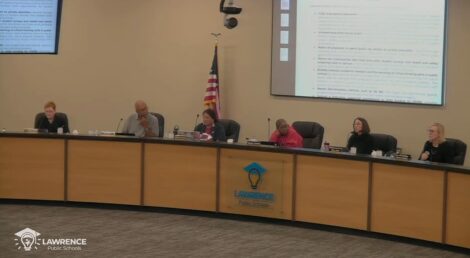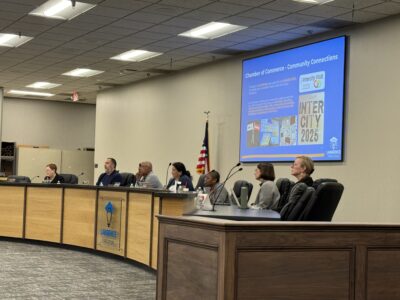Lawrence school district ceases its use of student surveillance software Gaggle
District denies online monitoring program violated students' rights

photo by: Josie Heimsoth/Journal-World
The Lawrence school district offices building, located at 110 McDonald Dr., is pictured in May 2025.
The Lawrence school district has stopped using Gaggle software on its devices, and attorneys for the district filed a motion to dismiss many claims in a lawsuit filed by former and current students who have claimed the monitoring technology is unconstitutional.
The school district signed a contract with Gaggle in 2023 for $162,000, and according to a declaration submitted by Superintendent Jeanice Swift on Monday, the contract ended in summer 2025, and it has not been renewed for the 2025-2026 school year.
“The School District has stopped using Gaggle to monitor students,” Swift said in the declaration.
The lawsuit was filed by nine current and former Lawrence and Free State High School students in August, and it alleges that the Lawrence school district has been violating their First and Fourth Amendment rights by conducting illegal searches of the digital files the student journalists produce. The defendants in the case include the school district, the school board and Greg Farley, assistant principal at LHS.
In a motion filed Monday, the district’s attorneys asked the court to throw out several parts of the lawsuit. They specifically requested the dismissal of all claims against both the school board and Greg Farley as well as claims made by students who have already graduated and “are no longer subject to the School District’s alleged censorship using Gaggle.”
The attorneys argued that Farley had no involvement in implementing the Gaggle monitoring system or in disciplining any students based on material flagged by Gaggle, and that the school board cannot be sued separately from the district because it is its governing body and it is not a separate legal entity.
Monday was also the deadline for the district to respond to the plaintiff’s complaints. The district argues that the use of the Gaggle monitoring system was lawful and ensured student safety under the Children’s Internet Protection Act. The district said any restrictions on speech were reasonable, educationally justified, and did not violate the First Amendment. They claim there was no censorship, prior restraint, or interference with freedom of the press.
In regards to the Fourth Amendment, the defendants argue that Gaggle’s monitoring did not constitute unlawful searches or seizures because students had no reasonable expectation of privacy on school-provided platforms. All searches, they claim, were justified, consensual, or performed under special circumstances such as emergencies.
In addition, the district said the plaintiffs no longer have a valid reason to seek ongoing relief because the school district is already phasing out the use of Gaggle, and journalism students are no longer monitored by it.
Gaggle is specifically designed to monitor email and online accounts in the district’s network, by honing in on keywords that could indicate “concerning behavior” when a student uses them, such as “suicide,” “self-harm,” “bomb” or “gun.” It also scans pictures, videos, attachments and links via a process that combines artificial intelligence and human moderators.
As the Journal-World reported, towards the end of August, the plaintiffs alleged that Quentin Rials, the principal of Lawrence High School, issued a directive to the school’s newspaper, The Budget, and its student reporters to not report on the lawsuit. In response, Rials said he wanted to ensure that the school staff and the newspaper were on the same page: The student journalists at Lawrence High School are not restricted in any manner from reporting on topics of interest.
Next up in the lawsuit is a response by the plaintiffs, which scheduled to be filed by Nov. 17.





